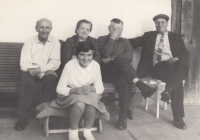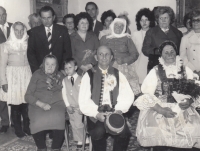They stormed in our home with guns in their hands
Download image
Josef Jehlička, born on 25 November 1945 in Zlín, experienced the arrest of his grandfather Josef Bruštík on 24 February 1950 as a young child. His father, Josef Jehlička, was arrested on the same day. In the Bruštík and associates trial, Anna Honová, then Krmenčíková, who worked as a correspondent in Bruštík’s former company Sběr in Uherský Brod (after the nationalization of the company, J. Bruštík acted as its director), was subsequently tried. During the two years of detention, which the all the accused spent partly in Uherské Hradiště and partly in Brno, several trials took place (J. Bruštík was also tried as part of the illegal group Včela). Charges of embezzlement, treason and illegal activities were brought. After the verdict, his father was released in February 1952, as he had served his sentence while being in custody. Josef Bruštík served his sentence in Mírov and Leopoldov. Thanks to an amnesty, he was released after 12 years (in total he was sentenced to 24 years). In the extensive investigation file V-2894 of the Security Services Archives of the Czech Republic, original prisoners´ secret notes and transcripts of the reports made by the agents who shared cells with the accused in Uherské Hradiště have been preserved. A description of an unrealized plan of a staged attempt of Josef Bruštík to escape across the border of Czechoslovakia (with the same features of the provocation method of the Action Stone and explicitly named as such in the file) has also been preserved. The trial of the witness´s grandfather and father had a devastationg impact on the status of all family members. For many years, the witness´s mother and grandmother had no chance to find employment, the witness father worked as a driver and delivered milk, and his grandfather Bruštík became a boiler operator. Although Josef Jehlička Jr. graduated from the grammar school in Uherský Brod, he was not admitted to the agricultural university for family background reasons. After the military service, which he completed at the airport in Brno-Slatina, he found a job as a bus driver. He continued to work in the car transport business after 1989 and later re-established the family company Sběr, which continues to operate on the market under the name Raciola. In 2023, he was living in Mirošov near Valašské Klobouky.

